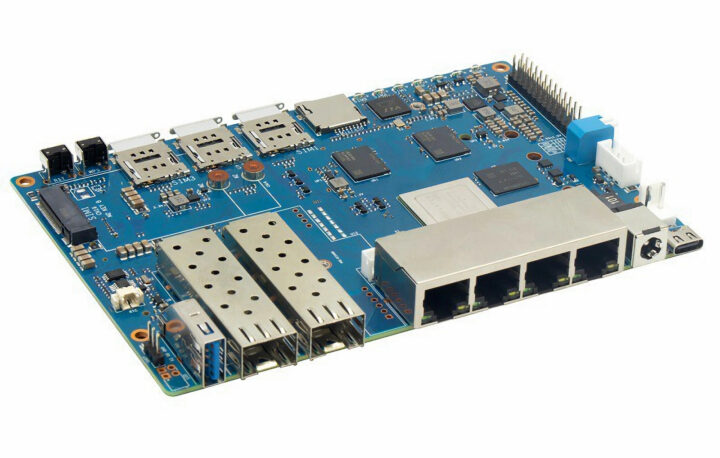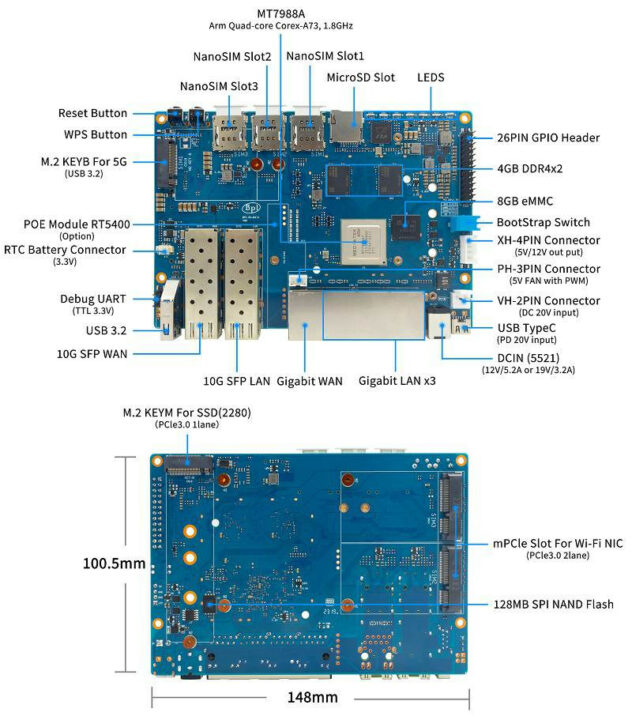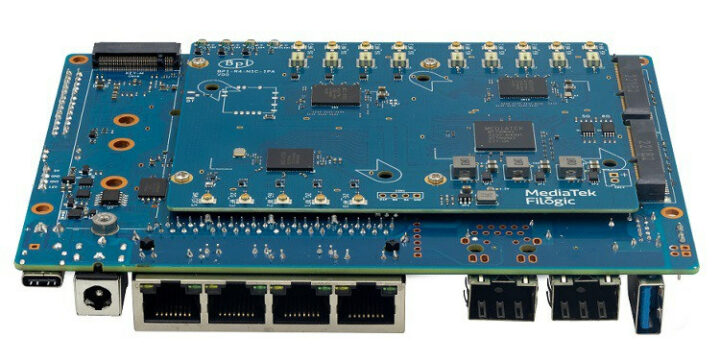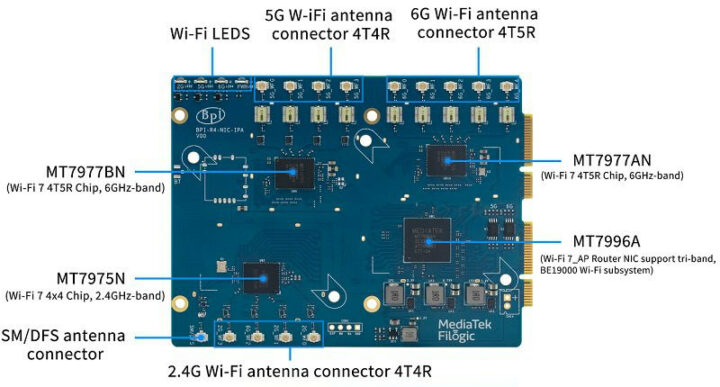Banana Pi BPI-R4 is a WiFi 7 router board powered by the MediaTek MT7988A (Filogic 880) quad-core Arm Corex-A73 processor with 4GB DDR4 RAM, 8GB eMMC flash, and 128MB SPI-NAND flash.
The board also comes with two 10GbE SFP cages, four Gigabit Ethernet RJ45 ports, a USB 3.2 port, as well as an M.2 socket for a 4G/5G modem or an NVMe SSD, and two mini PCIe slots with PCIe 3.0 to support WiFi 7.
Banana Pi BPI-R4 specifications:
- SoC – MediaTek MT7988A (Filogic 880) quad-core Arm Corex-A73 processor @ 1.8GHz with AI-powered packet accelerator
- System Memory – 4GB DDR4
- Storage – 8GB eMMC flash, 128MB SPI NAND Flash, microSD card slot, M.2 Key M for NVMe SSD (see Expansion section for details)
- Networking
- 2x 10GbE SFP cages (option for 1x 10Gbe SFP cage and 1x 2.5Gbe PHY)
- 4x Gigabit Ethernet RJ45 ports (1x WAN and 3x LAN)
- USB – USB 3.2 port
- Expansion
- M.2 Key-B slot with USB 3.2 interface for 5G or 4G LTE connectivity plus three nanoSIM slots
- M.2 Key-M slot with 1-lane PCIe 3.0 for NVMe SSD
- 2x mini PCIe slots with 2-lane PCIe 3.0 for Wi-Fi 7 NIC (Network Interface Card)
- 26-pin GPIO header for expansion
- Debugging – 3-pin header for 3.3V serial console
- Misc – Reset button, WPS button, bootstrap switch, RTC battery connector
- Power Supply
- 12V/5.2A or 19V/3.2A via DC jack
- 20V DC input via header
- Optional PoE module (RT5400)
- 5V/12V output header
- Dimensions – 148 x 100.5 mm (Same dimensions as Banana Pi BPI-R64 and Banana Pi BPI-R2)
- Weight – 250 grams
Banana Pi currently provides three OpenWrt images for the board for eMMC, NAND flash, or microSD card boot, and a Debian image is in the works as well. The wiki has some more extra information with schematics, DXF files, and a link to a BSP that has not been updated for four months. You may have noted the Banana Pi BPI-R4 board does not come with a WiFi 7 module by default, and it needs to be added via the two mini PCIe sockets as shown in the photo below.
The “WiFi 7 iPA NIC Module” is based on a four-chip design with MediaTek MT7996 (WiFi 7 tri-band BE19000 SoC), MT7995N (2.4 GHz WiFi), MT7977AN (6 GHz), and MT7977B (6 GHz).
The Banana Pi BPI-R4 can be purchased for $103.15 plus shipping on Aliexpress, but crazily enough this does not include the WiFi 7 card which I can’t find for sale anywhere yet… Since it’s Black Friday, you can also use coupon codes like CNXALI10 ($80+ orders) or CNXALI20 ($150+ orders) to get a $10 or $20 discount although some countries are excluded. If you are based in the US, you may want to use other coupon codes such as USAFF6, USAFF10, USAFF20, USAFF50, or USAFF80 instead. Those codes should work with any products on Aliexpress during the Black Friday promotion.
Thanks to TLS for the tip.
Update: This post was initially published on June 23, 2023, and updated following the launch of the Banana Pi BPI-R4 on Aliexpress

Jean-Luc started CNX Software in 2010 as a part-time endeavor, before quitting his job as a software engineering manager, and starting to write daily news, and reviews full time later in 2011.
Support CNX Software! Donate via cryptocurrencies, become a Patron on Patreon, or purchase goods on Amazon or Aliexpress








